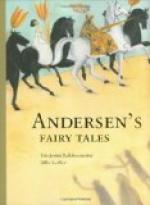“I say nothing, it is true,” exclaimed the King; “but I have my own opinion, notwithstanding.”
Now the trial was to take place. The Flea jumped so high that nobody could see where he went to; so they all asserted he had not jumped at all; and that was dishonorable.
The Grasshopper jumped only half as high; but he leaped into the King’s face, who said that was ill-mannered.
The Leap-frog stood still for a long time lost in thought; it was believed at last he would not jump at all.
“I only hope he is not unwell,” said the house-dog; when, pop! he made a jump all on one side into the lap of the Princess, who was sitting on a little golden stool close by.
Hereupon the King said, “There is nothing above my daughter; therefore to bound up to her is the highest jump that can be made; but for this, one must possess understanding, and the Leap-frog has shown that he has understanding. He is brave and intellectual.”
And so he won the Princess.
“It’s all the same to me,” said the Flea. “She may have the old Leap-frog, for all I care. I jumped the highest; but in this world merit seldom meets its reward. A fine exterior is what people look at now-a-days.”
The Flea then went into foreign service, where, it is said, he was killed.
The Grasshopper sat without on a green bank, and reflected on worldly things; and he said too, “Yes, a fine exterior is everything—a fine exterior is what people care about.” And then he began chirping his peculiar melancholy song, from which we have taken this history; and which may, very possibly, be all untrue, although it does stand here printed in black and white.
THE ELDERBUSH
Once upon a time there was a little boy who had taken cold. He had gone out and got his feet wet; though nobody could imagine how it had happened, for it was quite dry weather. So his mother undressed him, put him to bed, and had the tea-pot brought in, to make him a good cup of Elderflower tea. Just at that moment the merry old man came in who lived up a-top of the house all alone; for he had neither wife nor children—but he liked children very much, and knew so many fairy tales, that it was quite delightful.
“Now drink your tea,” said the boy’s mother; “then, perhaps, you may hear a fairy tale.”
“If I had but something new to tell,” said the old man. “But how did the child get his feet wet?”
“That is the very thing that nobody can make out,” said his mother.
“Am I to hear a fairy tale?” asked the little boy.
“Yes, if you can tell me exactly—for I must know that first—how deep the gutter is in the little street opposite, that you pass through in going to school.”
“Just up to the middle of my boot,” said the child; “but then I must go into the deep hole.”
“Ah, ah! That’s where the wet feet came from,” said the old man. “I ought now to tell you a story; but I don’t know any more.”




